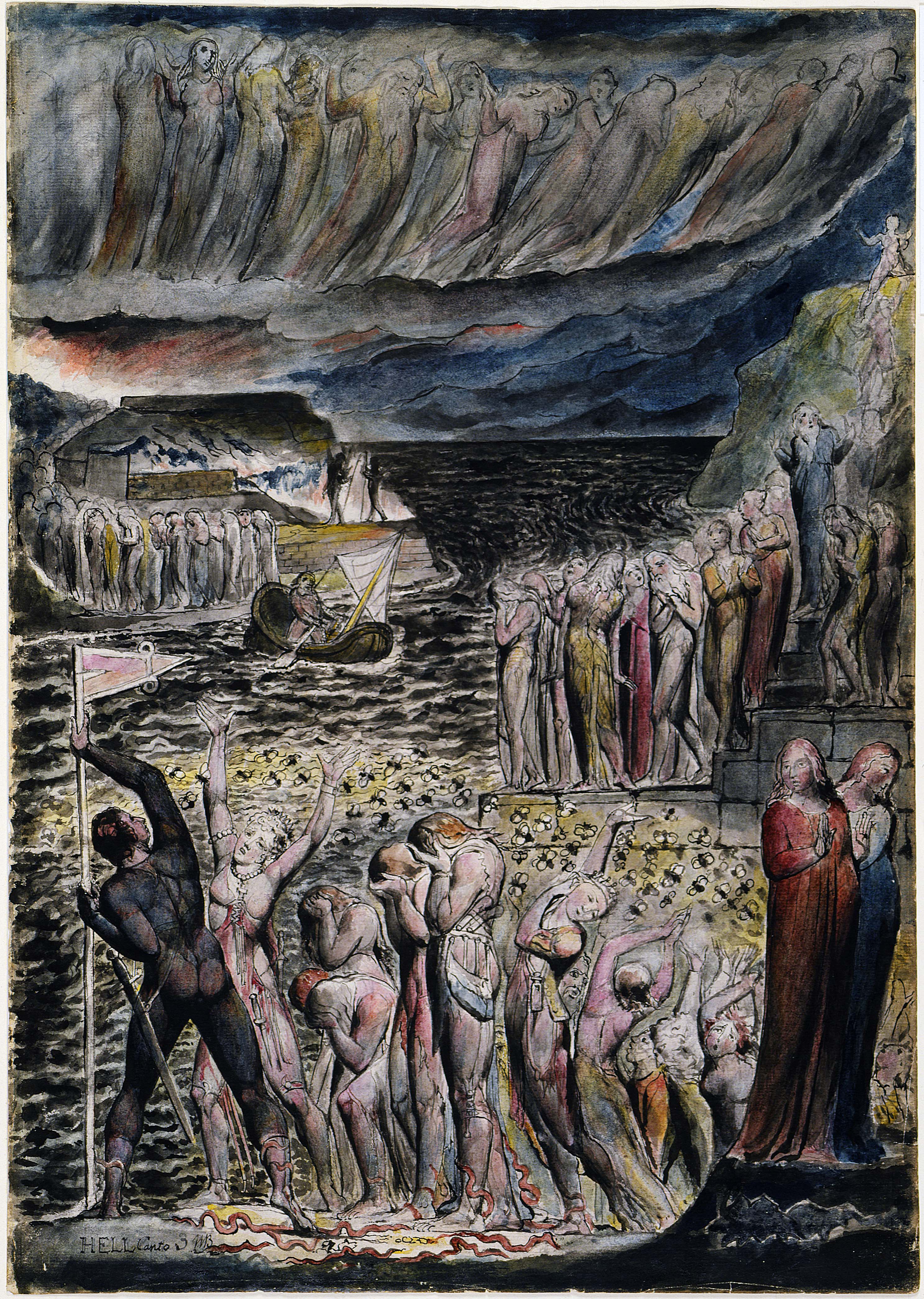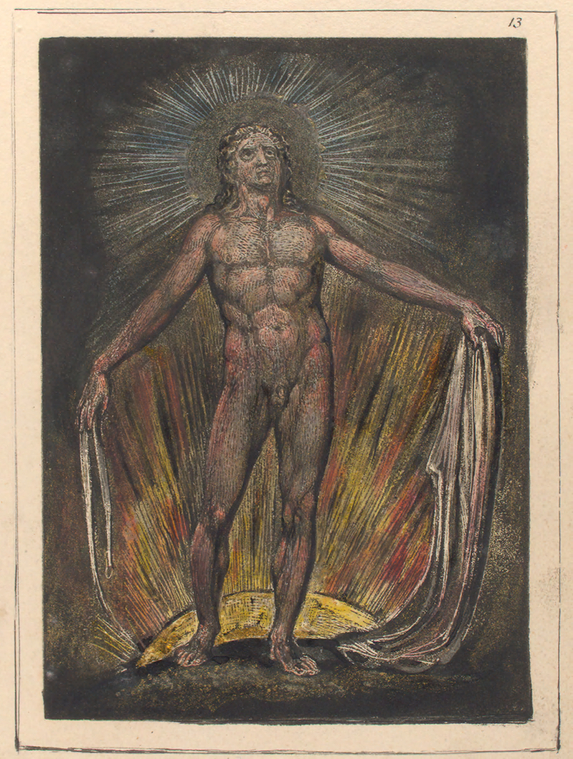 |
British Museum Illustrations to Young's Night Thoughts |
Henry Crabb Robinson was a journalist and a lawyer, but he is
remembered for his interest in interviewing exceptional people,
especially people of genius. Blake was in his waning years when he
became acquainted with Robinson through a supporter - Mrs Aders.
Since Robinson was a devoted Diarist he recorded accounts of his
visits with Blake whom he found both interesting and perplexing.
Blake had spent his lifetime meditating on the relationship
between God and man. Although his ideas were startling to
Robinson, they were well reasoned on the basis of his own
experience of the spiritual dimension. The thinkers who had
influenced Blake were foreign to Robinson. But because Robinson
continued to visit him and engage in conversation, Blake expressed
his unconventional ideas and Robinson preserved them in his dairy.
There is no evidence that Robinson ever really grasped what Blake
was talking about.
DIARY REMINISCENCES AND CORRESPONDENCE of HENRY CRABB ROBINSON
Vol 2 - including Blake
Robinson wrote:
December 10th [1825] - Dined with Aders. A very remarkable and
interesting evening. The party at dinner, Blake the painter, and
Linnell a painter. In the evening Miss Denman and Miss Flaxman
came. Shall I call Blake artist, genius, mystic or madman.
Probably he is all. I will put down without method what I can
recollect of the conversation of this remarkable man. He has a most
interesting appearance. He is now old (sixty eight), pale with a
Socratic countenance and an expression of great sweetness though
with something of languor about it except when animated, and then
he has about him an air of inspiration The conversation turned on
art, poetry, and religion. He brought with him an engraving of his
Canterbury Pilgrims. One of the figures in it is like a figure in a
picture to Mr Aders. "They say I stole it from this picture said
Blake but I did it twenty years before. I knew of this picture in
my youth I was always studying paintings of this kind, wonder
there is a resemblance." In this he seemed to explain humanly what
he had done. But at another time he spoke of paintings as being
what he had seen in his visions And when he said my visions it was
in the ordinary unemphatic tone in which speak of every day
matters. In the same tone he said repeatedly, "The Spirit told me."
I took occasion to say, "You express as Socrates used to do." What
resemblance do you suppose there between your spirit and his. "The
same as between our countenances." He paused and added, "I was
Socrates" and then as correcting himself said, "a sort of brother.
I must have had conversations with him. So I had with Jesus Christ, I have an
recollection of having been with both of them." I suggested on
philosophical grounds the impossibility of supposing an immortal
being created, an eternity à parte post without an eternity à
parte ante. His eye brightened at this and he fully concurred with
me. "To sure it is impossible. We are all co existent with God
members the Divine body. We are all partakers of the Divine
nature." In this by the by Blake has but adopted an ancient Greek
idea connected with this idea.
I will mention here though it formed of our talk as we were walking homeward that on my asking in what light he viewed the great question concerning the deity of Jesus Christ he said, "He is the only God." But then he added' "and so am I and so are you." He had just before and that occasioned question been speaking of the errors of Jesus Christ. "Jesus Christ should not have allowed himself to be crucified and should not have attacked the Government." On my inquiring how this view could be reconciled with the sanctity and Divine qualities of Jesus. Blake said, "He was not then become the Father." Connecting well as one can these fragmentary sentiments it would be hard to fix Blake's station between Christianity, Platonism, and Spinozism. Yet he professes to be very hostile to Plato and reproaches Wordsworth with being not a Christian but a Platonist.
...
"There is no use in education. I hold it to be wrong It is the great sin It is eating of the tree of the knowledge of good and evil. This was the fault of Plato He knew of nothing but the virtues and vices and good and evil. There is nothing in all that Everything is good in God's eyes." On my putting the obvious question, "Is there nothing absolutely evil in what men do" - "I am no judge of that. Perhaps not in God s eyes." He sometimes spoke as if he denied altogether the existence of evil and as if we had nothing to do with right and wrong; it being sufficient to consider all things as alike the work of God. Yet at other times he spoke of there being error in heaven. I asked about the moral character of Dante in writing his "Vision" - was he pure? "!Pure!" said Blake; "do you think there is any purity in God's eyes. The angels in heaven are no more so than we. 'He chargeth his angels with folly.'" He afterwards represented the Supreme Being as liable to error. "Did he not repent him that he had made Nineveh?" It is easier to repeat the personal remarks of Blake than these metaphysical speculations, so nearly allied to the most opposite systems of philosophy. Of himself he said he acted by command. The Spirit said to him, "Blake be an artist and nothing else." In this is felicity. His eye glistened while he spoke of the joy of himself solely to divine art. Art is inspiration. When Michael or Raphael or Mr Flaxman does any of his fine things, he does them in the Spirit." Blake said, "I should be sorry if I had earthly fame, for whatever natural glory a man has is so much from his spiritual glory. I wish to do nothing for profit. I wish to live for art. I want nothing whatever. I am quite happy."
...
February 2nd [1827]- Götzenberger the young painter from Germany and I
accompanied him to Blake. We looked over Blake's Dante. Götzenberger
was highly gratified by the designs. I interpreter between them. Blake
seemed gratified by the visit said nothing remarkable.
It was on this occasion that I saw Blake for the last. He died on the
12th of August. His genius as an artist was by Flaxman and Fuseli, and
his poems excited great interest in. His theosophic dreams bore a close
resemblance to those Swedenborg. I have already referred to an article
written by me on Blake for the Hamburg Patriotic - Annals 5. My interest
in remarkable man was first excited in 1806. Dr Malkin our Grammar
School head master published in that year a memoir of a very precocious
child who died. An engraving of a portrait of him by Blake was prefixed.
Dr Malkin gave an account of Blake as a painter and poet and of his
visions and added some specimens his poems including the Tiger.
...
Late 1827 - visit to Catherine
She had the wife's virtue of virtues, an implicit reverence for her husband. It is quite certain that she believed in all his visions. On one occasion speaking of his visions she said, "You know, dear, the first time you saw God was when you were four years old and he put his head to the window and set you a screaming." In a word she was formed on the Miltonic model, and, like the first wife, Eve, worshipped God in her husband.
"He for God only she for God in him"
From Blake's Notebook, (E481)
"I rose up at the dawn of day
Get thee away get thee away
Prayst thou for Riches away away
This is the Throne of Mammon grey
Said I this sure is very odd
I took it to be the Throne of God
For every Thing besides I have
It is only for Riches that I can crave
I have Mental Joy & Mental Health
And Mental Friends & Mental wealth
Ive a Wife I love & that loves me
Ive all But Riches Bodily
I am in Gods presence night & day
And he never turns his face away
The accuser of sins by my side does stand
And he holds my money bag in his hand
For my worldly things God makes him pay
And hed pay for more if to him I would pray
And so you may do the worst you can do
Be assurd Mr Devil I wont pray to you
Then If for Riches I must not Pray
God knows I little of Prayers need say
So as a Church is known by its Steeple
If I pray it must be for other People
He says if I do not worship him for a God
I shall eat coarser food & go worse shod
So as I dont value such things as these
You must do Mr Devil just as God please"





